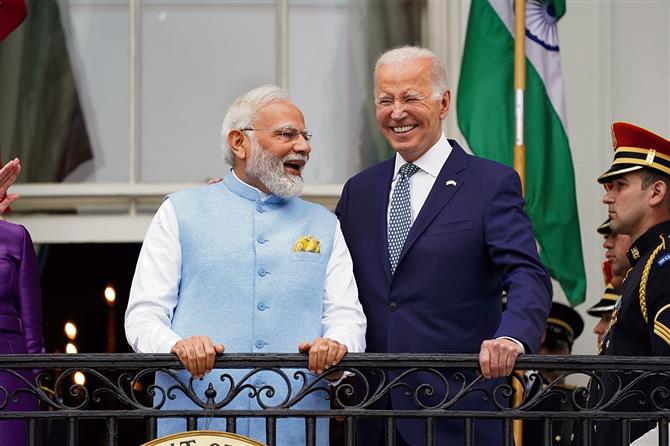India and the US on Thursday resolved to take their ties to the next level by agreeing to partner in cutting-edge technologies, resolve long-standing trade issues and enhance people-to-people ties with an easier visa regime and more consulates following meetings between Prime Minister Narendra Modi and US President Joe Biden at the White House in Washington.
Addressing a joint press conference, Modi said the “important decisions have added a new chapter to our comprehensive and global strategic partnership and given it a new direction and new energy”. “For the partnership between India and the US, even the sky is not the limit. The most important pillar of our relations is our people-to-people ties. More than 40 lakh people of Indian origin are contributing to the development of America,” the PM said. Biden described the ties as “most consequential, which have now become stronger, closer and most dynamic”.
The landmark decisions taken over two rounds of Modi-Biden talks included tech giant Micron setting up a plant for chip assembly, testing and packaging in Gujarat; an MoU between Hindustan Aeronautics Limited (HAL) and GE to make jet engines in India; the decision by Advanced Materials to set up a plant in India; and the move to purchase advanced drones from the US.
In order to enhance people-to-people ties, which both leaders said “gave muscle to the relationship”, the US will open new consulates in Bengaluru and Ahmedabad while India will do so in San Diego. Taking a question on the “backsliding” of democratic values in India, PM Modi expressed surprise over the query. “I am actually really surprised. India is still a democracy.
As Biden mentioned, democracy is in the DNA of India and America. Its spirit runs in our veins. Our ancestors have put words to this concept—that is in our Constitution,” he said. “There is absolutely no space for discrimination. India believes in moving ahead with everybody. In India, the benefits provided by the government are available to all. There is absolutely no discrimination based on caste, creed or age,” he said.
Asked about him calling Chinese President Xi Jinping a dictator, and whether he had discussed the need to preserve democratic values in India, Biden said, “The PM and I had a good discussion about democratic values. The nature of our relationship is straightforward. We respect each other. The US and China are not in the same space. There is overwhelming respect over the common democratic character of both nations. I believe that it is in every citizen in US and India’s DNA.”
In his opening statement, the PM said, “Today is a day that has special importance in the history of India-US relations.” The two sides have decided to make a new beginning in trade relations. The Initiative on Critical and Emerging Technologies has emerged as an important framework for technical cooperation by increasing cooperation in artificial intelligence, semiconductors, space, quantum computing and telecom.
“We are creating a strong and futuristic partnership. Decisions taken by Micron, Google and Applied Materials to invest in India symbolises this framework partnership,” observed the PM. Biden also referred to the large order placed by Indian aviation companies for Boeing planes.
On Ukraine, Biden said he and Modi talked about “shared efforts to mitigate the tragedy unleashed by the Russian invasion”. Modi said: “From beginning of the conflict in Ukraine, India has laid emphasis on dialogue and diplomacy. We are completely ready to contribute any way we can to restore peace.”
The two leaders also agreed to expand the G20 by giving full membership to the African Union. Before the talks, the PM said Biden’s commitment to the India-US relationship has inspired his government to take “bold and audacious” steps.



